How to prioritize the development. Experience in implementing GIST + ICE in Yandex.Market
Consider one of the divisions of Yandex.Market. It is quite large - 85 people. Inside the unit there are several teams. The teams either deal with the functional parts of the Market or solve some large user task. Here is one of them: to change the Yandex.Market service and Internet commerce in the regions so that it becomes more convenient for local users to solve their problems.
How do teams start? How to explain to everyone around why we are doing one thing and not another? How to convey to each engineer, why he is engaged in his current task? How to invest strength in something that will truly improve the world around you, and not waste time on things that are not needed? How to make teams work transparent for each other?
In order to better answer these and other questions, we have implemented a special approach. In accordance with it, we develop products and prioritize.
But first of all, let's designate the values that guided us. And then it will be clear that concrete decisions follow these principles.
So important things. We are trying:
- Create real value for a large number of users. We are a large-scale service and can affect the lives of millions of people.
- Inspire employees and realize their potential.
- Quickly implement meaningful changes.
The GIST + ICE framework is pretty good for this value system.
What does this mean?
To find solutions that are really important and improve the lives of users, we need:
- Test a lot of product hypotheses.
- Quickly understand how useful ideas are.
- Correct them or discard completely and take on the following.
The GIST framework offers to select several entities and work with them.
Goals - the goals of the organization / unit. Can be formulated in the format of OKR (Objectives and Key Results). Objectives are a “textual” statement of purpose. Example: “Take half the e-commerce market”. Key Results describe measurable parameters that indicate that the goal has been achieved. Example: “To increase the share of services in online trading to 500 billion rubles. in year".
Ideas - infinitely replenished bank of ideas. These are assumptions on how to move towards goals. Example: “Let's give people the opportunity to write articles themselves and post them on the service. We believe that this will increase the information content and usefulness of the service. ”
Step projects - projects for the development of ideas. Example: "Test the prototype on 20 users."
Tasks - details at the level of tasks in the tracker.
It is important to check ideas with high quality, but not to spend too many resources on checking. Any idea at the initial stage of development can fail, so it is not necessary to fence the decision for centuries. You will lose the time and energy that could be invested in a good, necessary improvement.
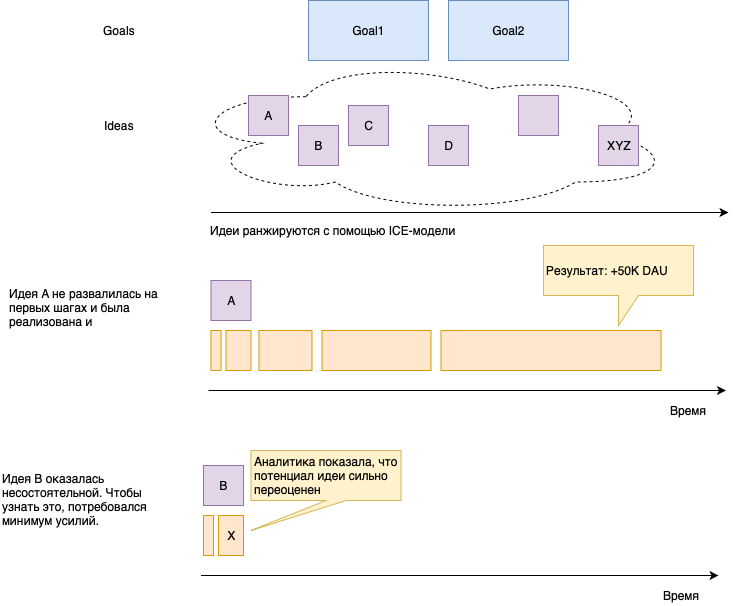
Now about ICE (Impact, Confidence, Effort). This is a way to prioritize, the answer to the question: what ideas to take in the study in the first place?
With each idea we associate three numbers:
- Impact is the potential expressed in the growth of user or business metrics. Here, per unit, we took the business growth by 1%.
- Effort - the cost of implementation. For the unit took one week of labor costs of one employee.
- Confidence - as far as we are confident in the estimates of Impact and Effort. A dimensionless quantity. We use a table that allows you to roughly estimate the confidence for the idea. The table shows the types of research and their confidence. For example, the opinion of a colleague is 0.2 units, the A / B test is 2000 units.
All three components change over time. Have you done the research? Got new numbers? Allow me to fix Impact and increase Confidence. Testing on the prototype showed that not enough essential functions? It is necessary to increase the Effort.
The general principle is this: the more we have conducted surveys, tests, experiments, the higher the Confidence and more reliable Impact and Effort.
Formula for ranking ideas that we apply:
The term K reflects reality: we are part of a large company. In this regard, there may appear reasons (reputational risks, customer opinions) that will require you to manually raise the priority of the idea and do something outside the normal queue.
That's all! It remains for all teams to bring their backlogs into a single place, put down the ICE values for them - and at the top there will be the most worthwhile ideas.
Next, you will see screenshots of our internal tools that have arisen during the implementation of GIST + ICE.
Internal table for converting product and business metrics to a single Impact dimension: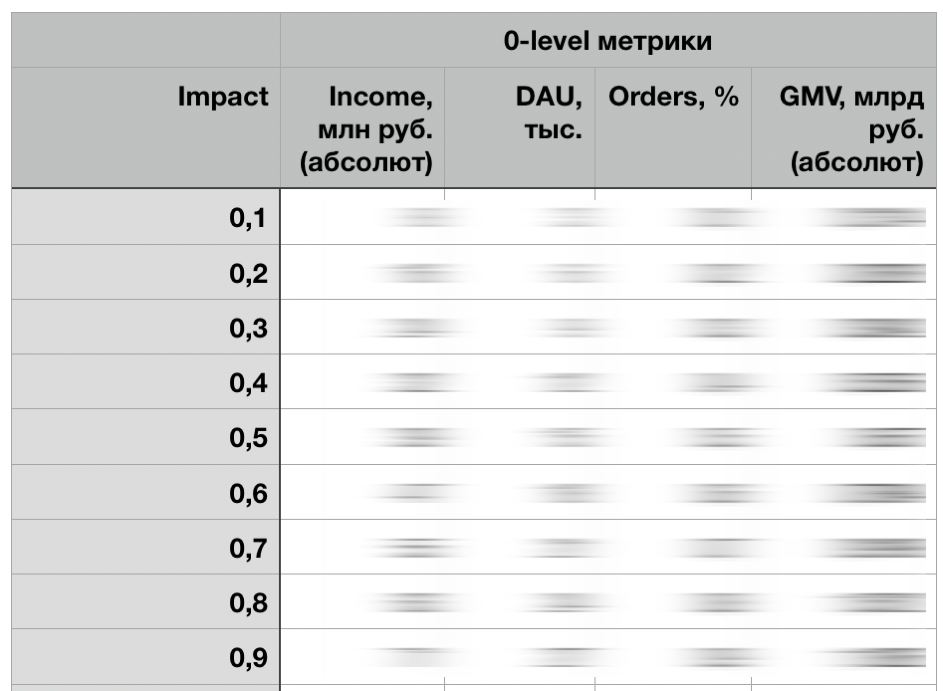
Approximate approach to the definition of Confidence:
Any employee of Yandex can bring an idea to the idea bank, and we guarantee that we will first estimate it (we put it down to ICE) in seven days. Then you can agree with the estimate or clarify the data to correct it.
Form to submit ideas: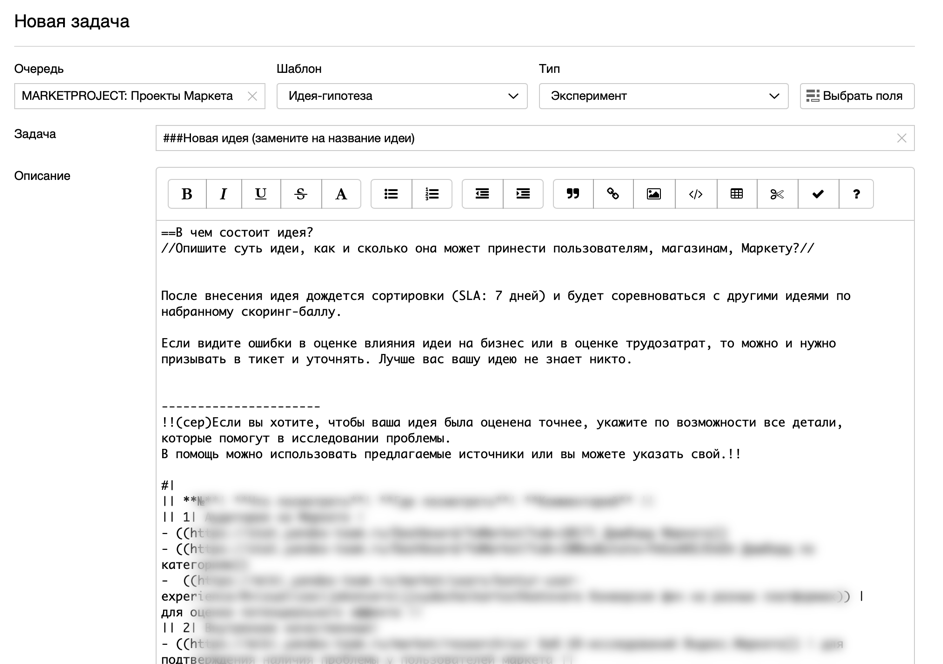
Here came the duty manager and tentatively evaluated the idea: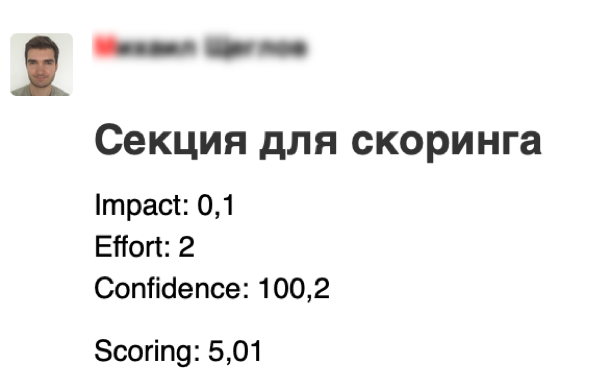
The robot tracks changes and recalculates the weight of ideas:
Top backlog of one of the teams:
We consider this distribution of time for tasks of different classes to be targeted: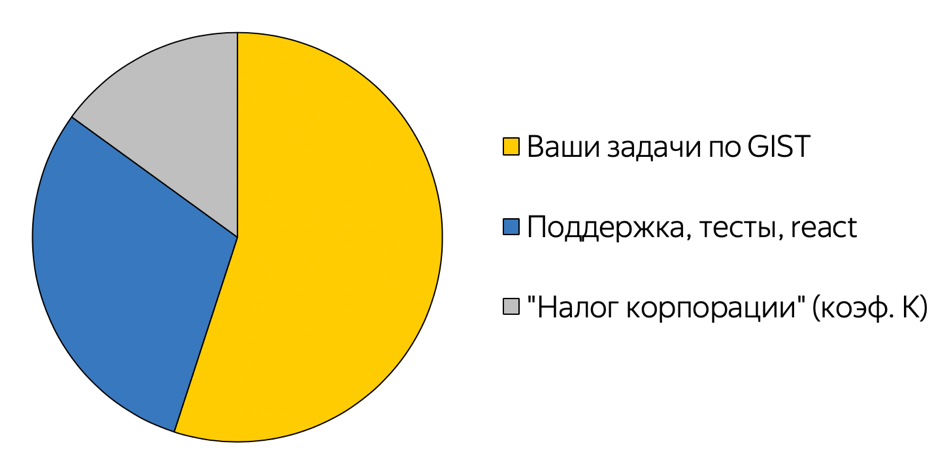
An inexpensive way to test a solution is to build a prototype of the available tools and see how users interact with it:
When you start to implement GIST + ICE, you may encounter difficulties. For example, customers will think that they are losing influence on product development. Or decide that you are fencing off, closing in and building barriers. And authors of ideas can be upset that their proposals are rejected. In this case, try to voice these ideas:
- A healthy business is impossible when someone is fenced off from someone and does not work with the opinions of others.
- There is always a component K. This is a signal to customers: you have everything under control. And everyone, including customers, try to use this lever less often.
- The task of the team leader is to have a clear and reasonable vision of the product in order to convince and involve others in their decisions.
- All ideas will not be implemented. Authors of proposals should understand this, as well as participate in the initial assessment and elaboration of ideas.
- Having implemented the framework, you will not immediately become magically effective. He will highlight some of your weaknesses, and more will have to work with them.
- Never tell people around things like "We don't do that: scoring is low." Stop it and ask the team to justify: why exactly the idea looks uninteresting? Others do not need to know that you have a GIST brain.
Thanks to the GIST + ICE framework, Yandex.Market employees are guided by the actual value of ideas for customers, saving resources and realizing their potential.
Materials on the topic:
- GIST article: https://hackernoon.com/why-i-stopped-using-product-roadmaps-and-switched-to-gist-planning-3b7f54e271d1
- Translation to Habré: https://habr.com/company/kolesa/blog/358672/
- OKR: https://www.ted.com/talks/john_doerr_why_the_secret_to_success_is_setting_the_right_goals
- Taming the Squeaky Wheel: https://productmanagementfestival.com/taming-the-squeaky-wheel/
')
Source: https://habr.com/ru/post/434784/
All Articles